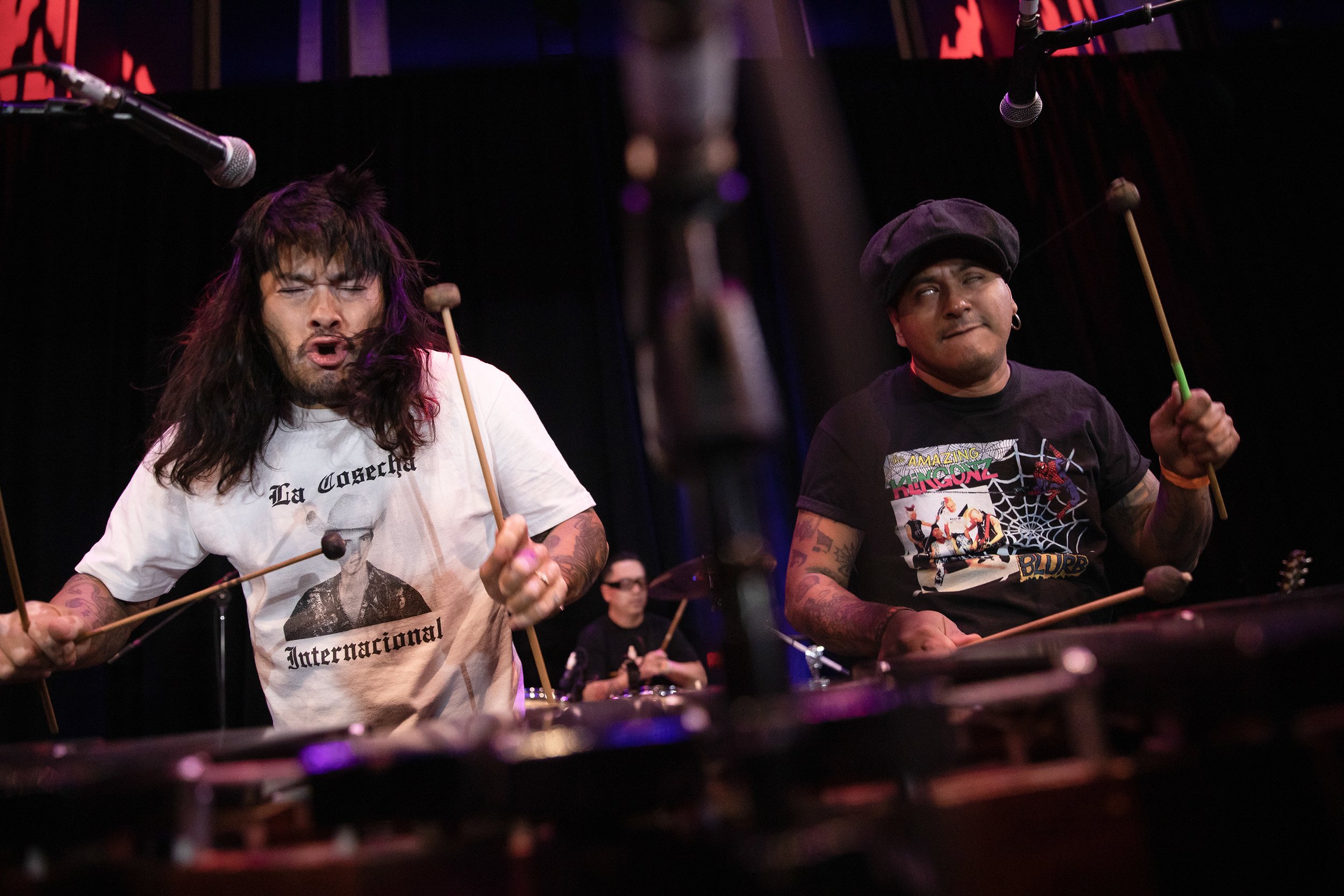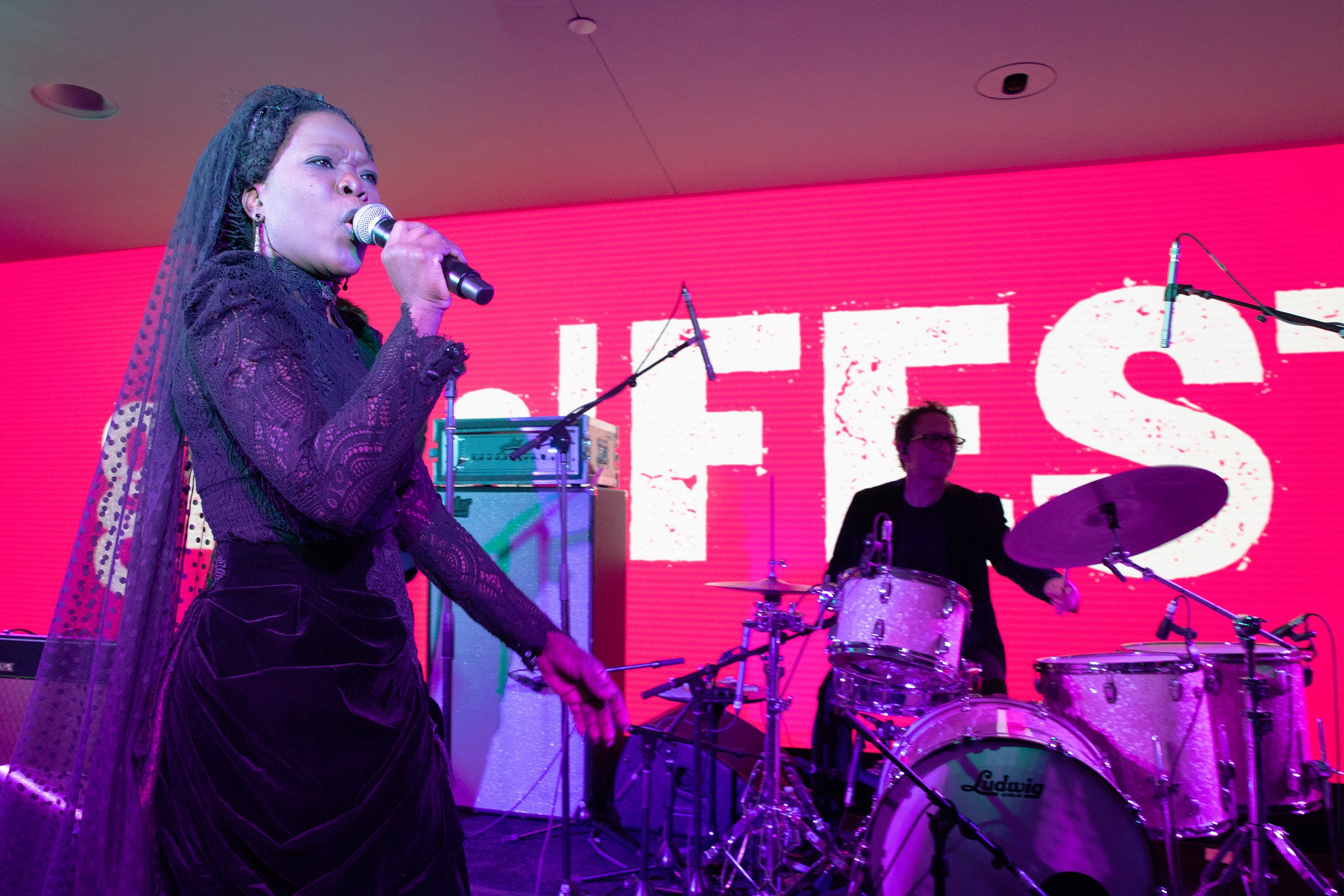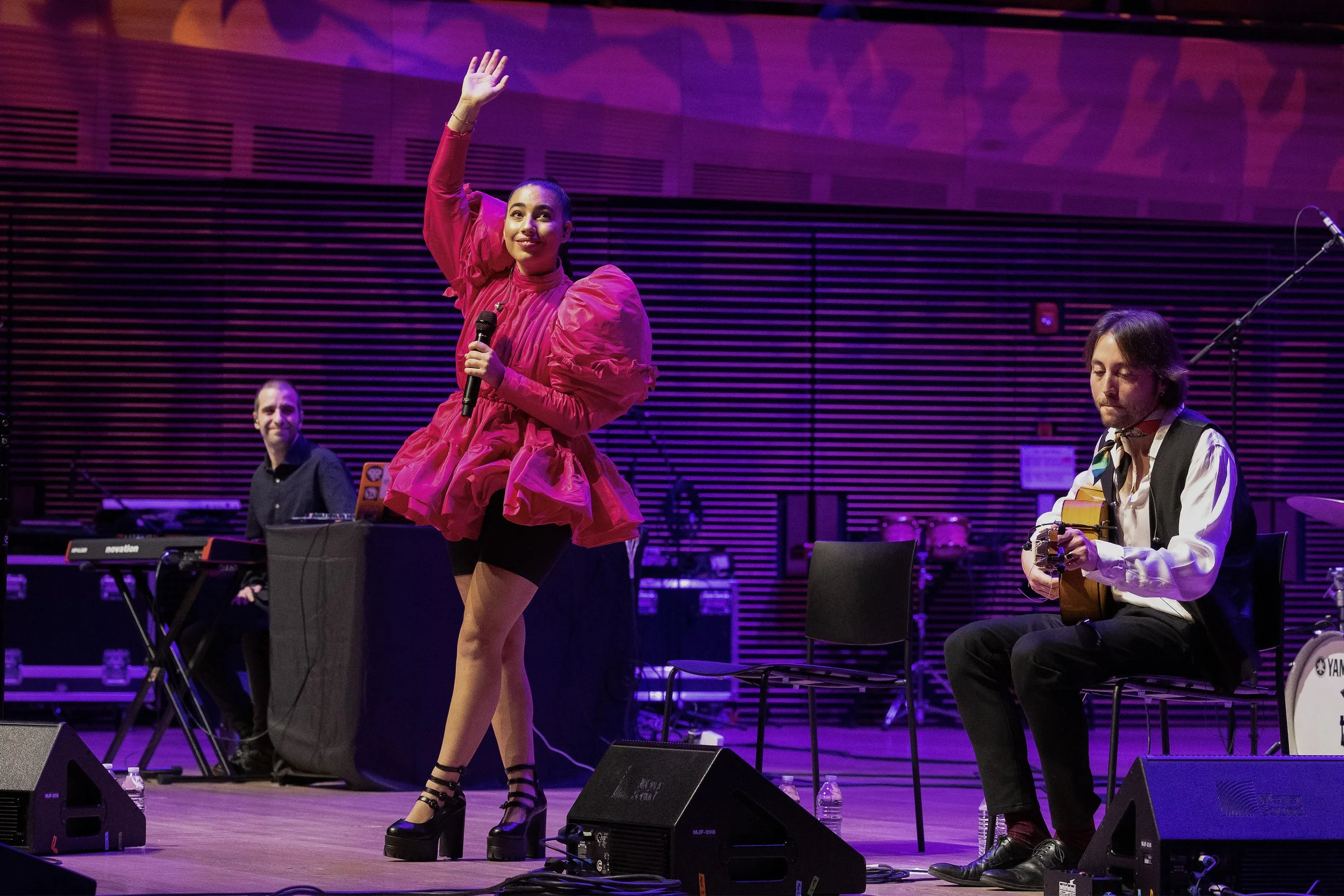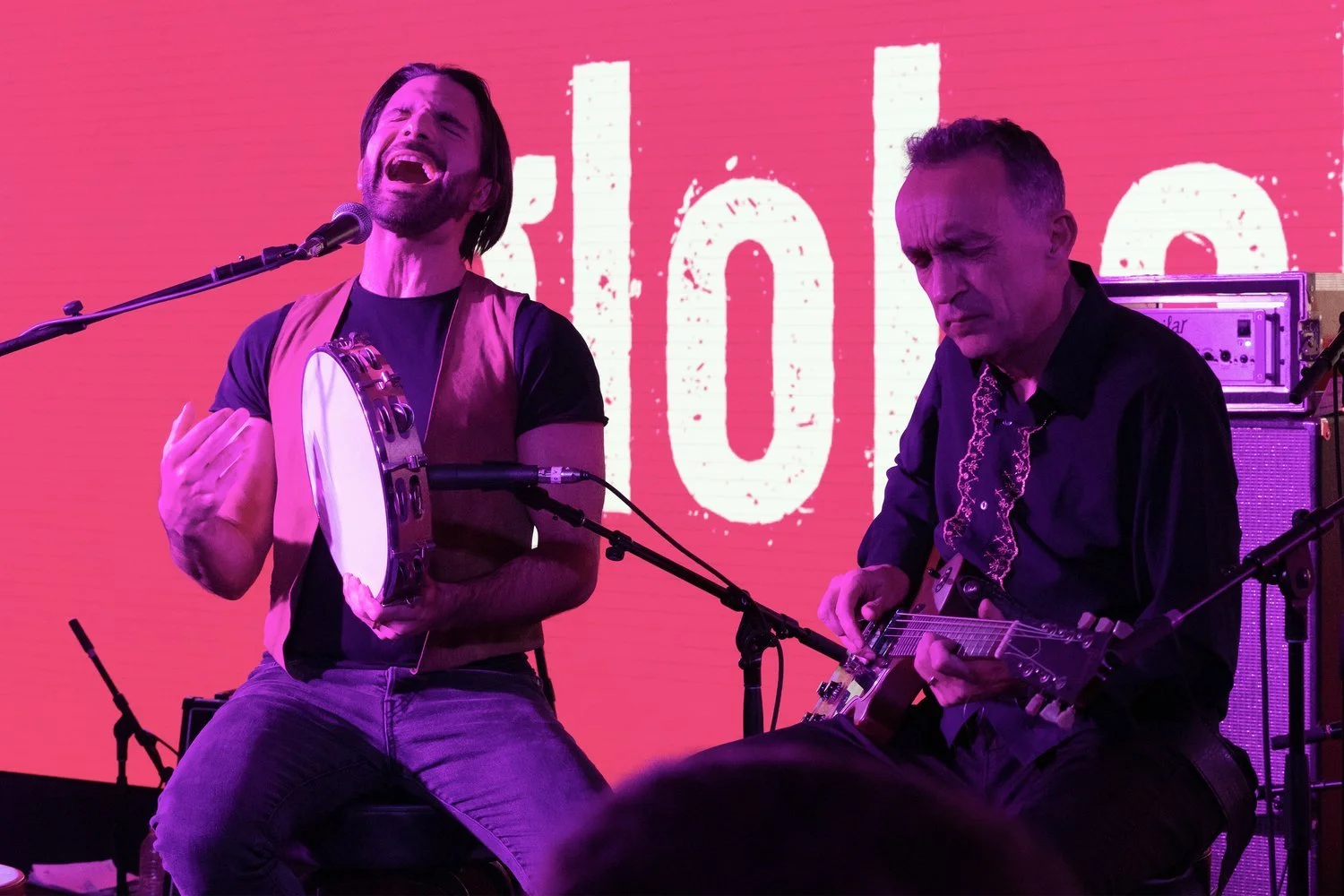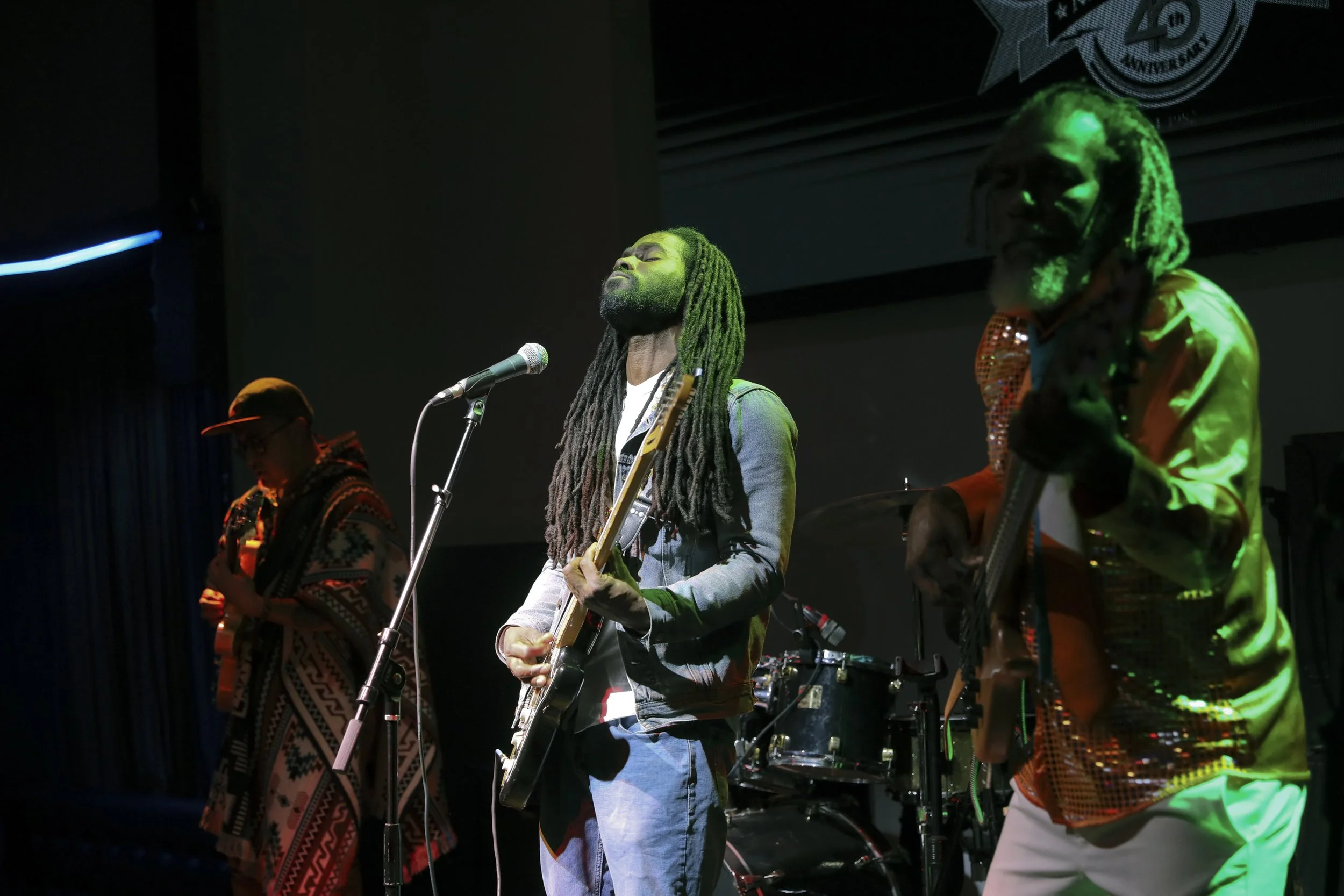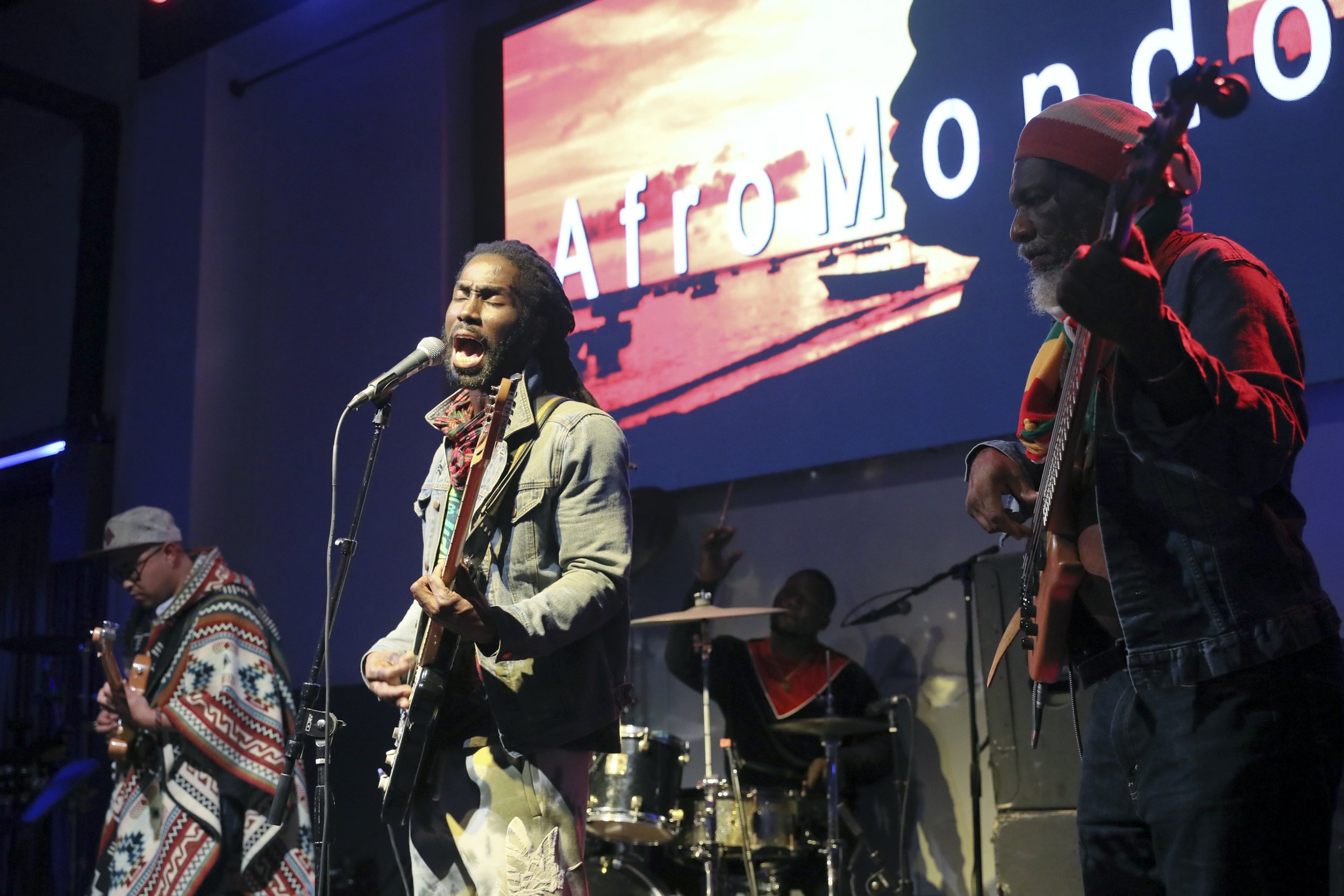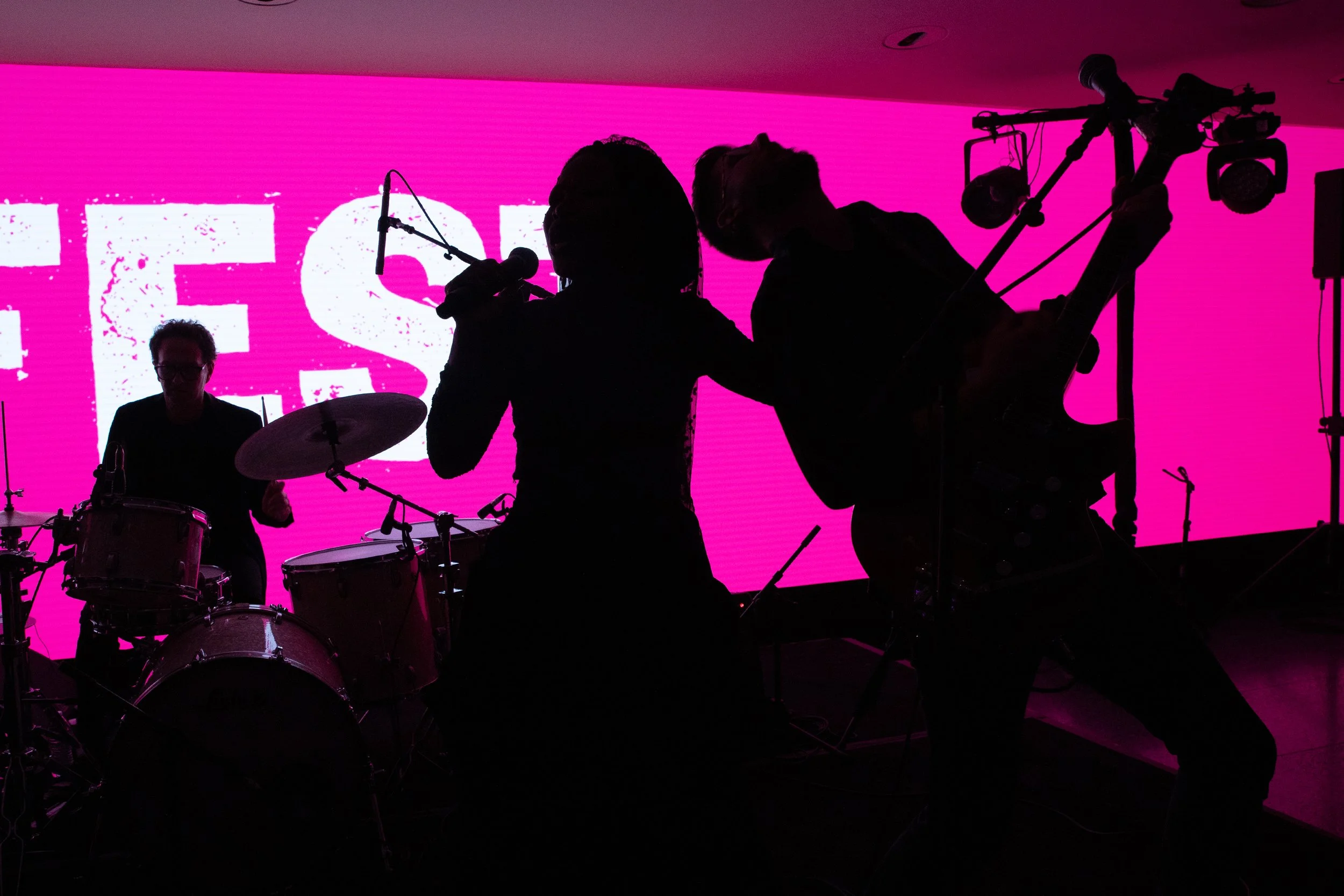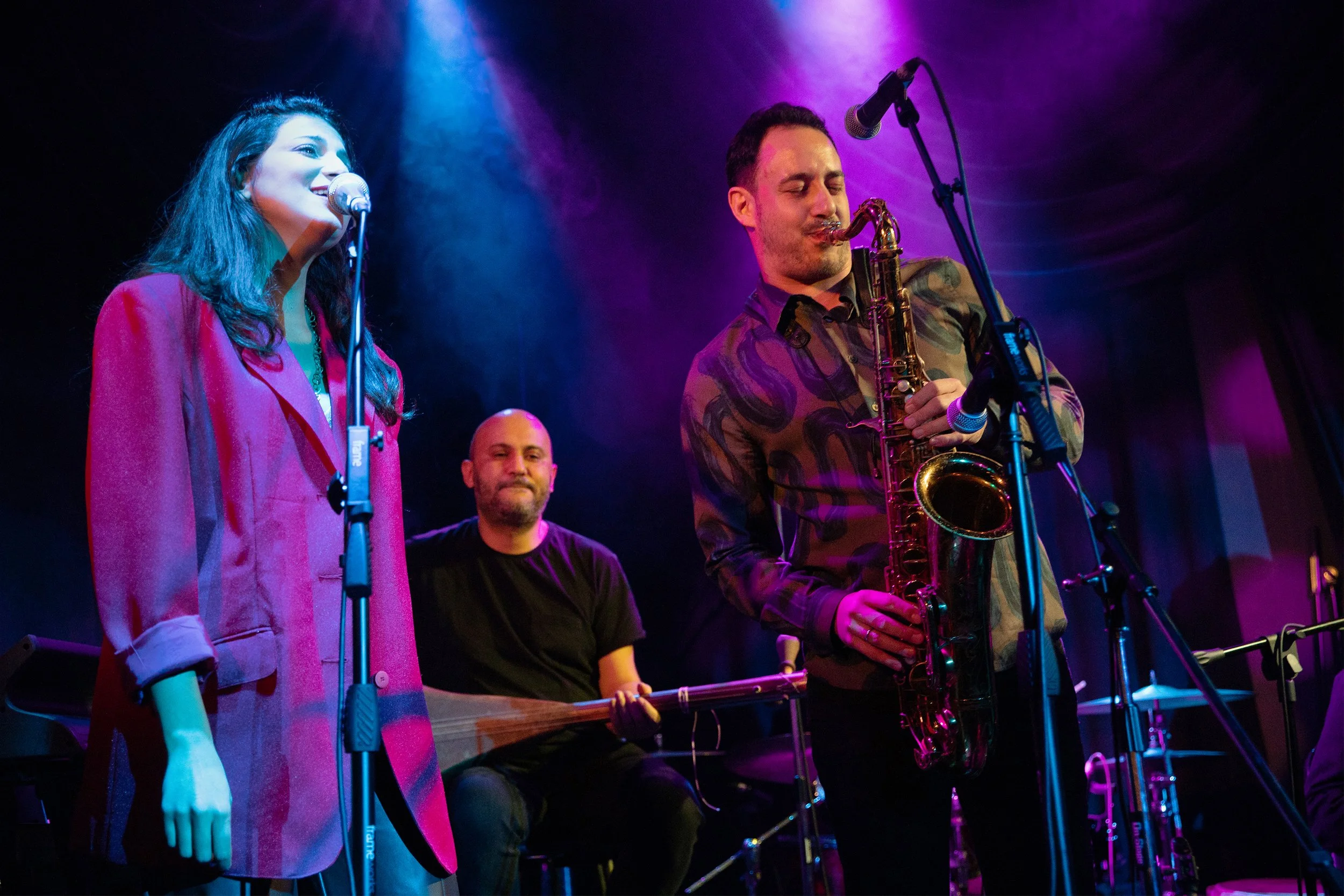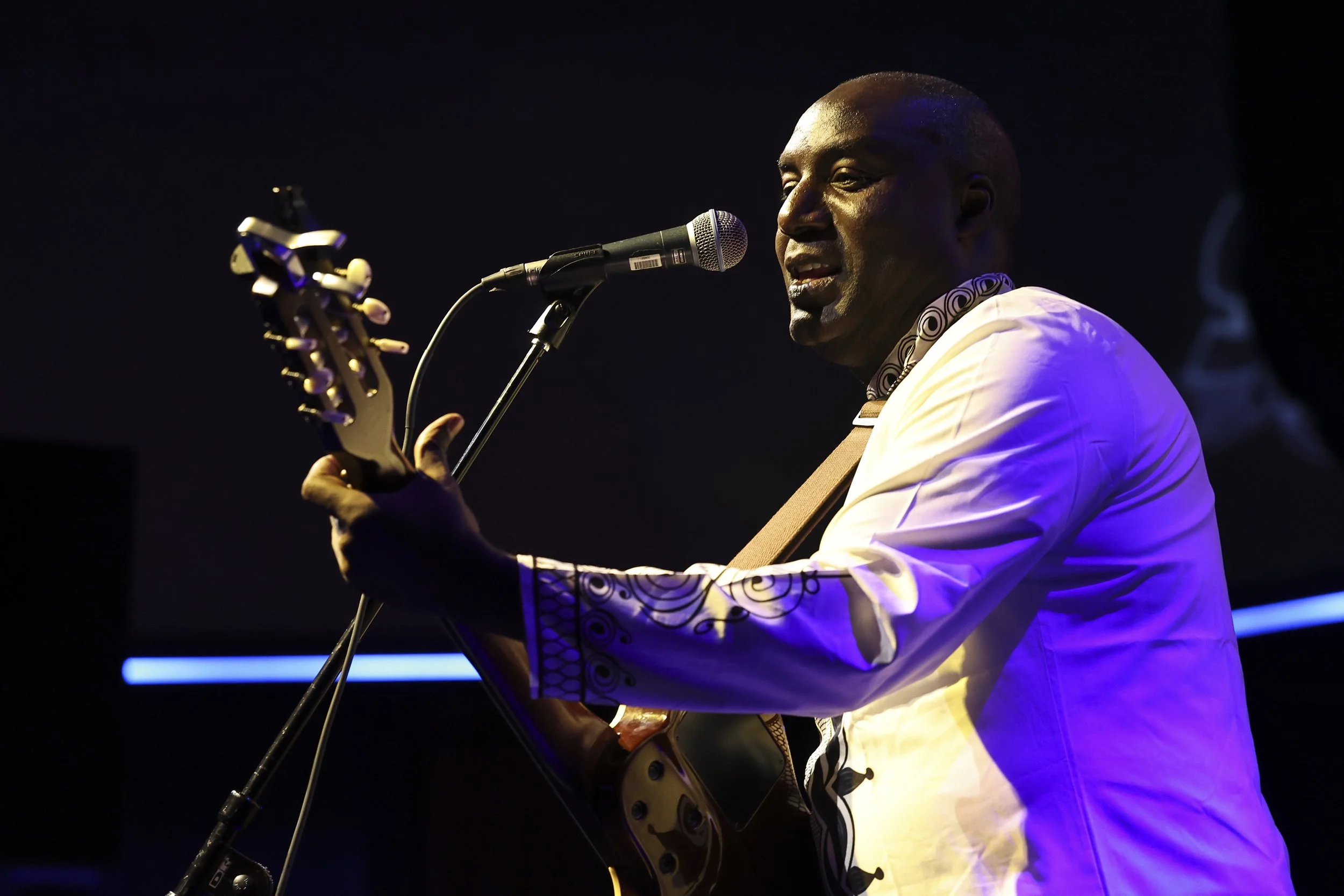GlobalFEST 2023 and APAP showcases
January 12-16th New York City stages hosted music from around the world. It has quietly become the most exciting weekend of world music on the calendar. GlobalFEST, celebrated it’s 20th year in 2023, at Lincoln Center. Downtown world music venues SOBs and Drom each hosted evenings showcasing music from around the world. Afromondo returned to SOBs with two shows featuring African and Latin American and Caribbean artists. Drom hosted the Good Night Festival in association with globalFEST, Global Toronto, Mundial Montreal, the International Indigenous Music Summit. The APAP Conference, an annual event held here by music presenters from across North America attracts musicians come from across the globe to showcase for the presenters in hopes of reaching new audiences. All were open to the public and featured 6-10 bands performing short sets.
Nkumu Katalay at The Triad Theater, Friday Jan. 13th, 9:30pm the Congo On 'Off Broadway’ show. (Dancer Tima Karega is featured in this clip.) Katalay performing his blend of “Rumbian Funk.” Nkumu is a favorite of New York City fans of Congolese music building up a loyal following that turned out for his show at the Triad. It was a full evening, not a showcase, but was open to APAP members. His music spans the range of his life’s experience, starting with his Congolese roots and compressing African American spirituals, Afro Cuban, and 70s funk into the mix.
Son Rompe Pera performing at globalFEST, at Lincoln Center January 15th, 2023
Son Rompe Pera, from Mexico City, closed globalFEST with a manic set of marimba led cumbia-punk. Led by brothers Jesús Ángel and Allan Gama (Kacho and Mongo) on marimbas they blazed into their set with both mastery of the traditionally based tunes and a ferocity that cast them in a new light.
Moonlight Benjamin performing at globalFEST, at Lincoln Center January 15th, 2023
Saxophonist Jaques Schwarz-Bart once commented that “Voodoo music is so melodic, intricate and majestic it can only be compared to opera”. Those qualities describe Moonlight Benjamin’s singing. She is both a is a voodoo priestess and an artist singing in the voodoo tradition but, in a conscious effort to reach out, embeds her songs in the roar of electrified blues rather than the myriad traditional rhythms. Moonlight’s vocals are indeed majestic as they soar over the straightforward drumming of Bertrand Noel, and the interplay between her two guitarists, Matthis Pascaud and Matthieu Vial-Collet build tension by repeating rhythmic patterns countered by crashing chords. Her singing taps into the unconscious and the music carries it to her audience. Moonlight Benjamin will release “Wayo” her new album on February 24th and return to the US on tour in April.
María José Llergo performing at globalFEST, at Lincoln Center January 15th, 2023
Esraa Warda performing Algerian & Moroccan dance in the North African women-led dance tradition with Bnat el Houariyat, an all-women Moroccan chaabi and houara music led by Khadija el Warzazia.
Justin Adams, guitar & Mauro Durante vocals and tamburello performing at globalFEST, at Lincoln Center January 15th, 2023
At first glance, the Duo Justin Adams (guitar) and Mauro Durante (violin, frame drum and vocals) seemed like an unlikely pairing. In fact it was a brilliant collaboration, Adams, is a rocking blues guitarist known for his work in Robert Plant’s Sensational Spaceshifters, while Durante is the leader of Canzoniere Grecanico Salentino, masters of Taranta, the folk music of southern Italy. They met, playing in Ludovico Einaudi’s Taranta Project in 2010 performing a concert that closed a big festival in Salento. Folklore says that in southern Italy the trance inducing music/dance was thought to be the result of being bitten by a tarantula spider which caused a psychological illness characterized by an extreme impulse to dance.
Tamikrest performing at globalFEST, at Lincoln Center January 15th, 2023
Tamikrest led by Ousmane Ag Mossa created an amiable groove drawing on the new album Tamotäit during their globalFEST appearance. The set closed out with some scintillating guitar from Paul Salvagnac. The quartet stuck to the Ishumar rock and Tuareg blues roots of the band, which the audience thoroughly enjoyed.
The Legendary Ingramettes performing at globalFEST, at Lincoln Center January, 15th 2023
Maggie Ingram and the Ingramettes, a family gospel group, went public in 1961 opening for the Soul Stirrers and the Dixie Hummingbirds at Richmond Virginia’s Mosque Theater.
Karim Youssef vocalist with the New York Arabic Orchestra performing at globalFEST, at Lincoln Center January, 15th 2023
British Dependency, Lead vocals and Guitar Ishmael Levi, Jaiden Fleming drums, Ras Marvin bass, and Edu Mora lead guitar from Anguilla performing at the Afromondo showcase, January 14th at SOBs in Manhattan
Francis Mbappe performing at Afromondo SOBs Showcase, Saturday January 14th 2023
Francis Mbappe performed a set that drew on jazz, makossa, and bikutsi putting Cameroonian music on the festival weekend map. He was backed by a full band including Dominick Kanza, guitar, and Harvey Wirht, drums. One of the greats on his instrument, the bass guitar, his playing is much in demand. His background includes his work as Manu Dibangu’s musical director for nearly a decade before settling in New York City and releasing several records with his band FM Tribe.
Sekouba Bolomba performing at the Afromondo show at SOBs, saturday, January 14th, 2023
Sekouba Bolomba is from the Abidjan waterfront in Treichville, a historically cosmopolitan blue-collar zone, with late-night clubs during the 70’s when reggae music took hold in Abidjan. In the early 80’s Alpha Blondy released “Jah Glory” and it was a huge hit selling over a million records. It was the dawn of the African Reggae era. Blondy was a step ahead of Tiken Jak Fakoly and Bolomba’s older brother Ishmael Isaac, artists who were able to bring the message of the music to the people in their own languages, Dioula, Baoulé, and the common language French. Bolomba followed in his brother’s footsteps.
Cheik Guisse, of Les Frères Guissé performing at the Afromondo showcase, January 14th at SOBs in Manhattan
Saturday at Afromondo night 2 at SOBs Cheikh Guissé performed a solo set which included a stunning solo version of the popular song “Yela” and in tribute to Nelson Mandela “Asimbonanga” a Johnny Klegg song.
Djely Tapa performing at the Good Night Showcase, friday, January 13th at Drom
“One is born a griot, But one becomes an artist.” - Djely Tapa says, and she is both. Born into a griot heritage in Mali, the daughter of Kandia Kouyate, she infused the soul of a jelimuso into her Good Night showcase. It is in her adopted home Montreal where the lively music scene pushed her as an artist. Performing regularly with artists such AfrotroniX, Donald Dogbo, Zal Idrissa Sissokho, Aboulaye Koné et Bolokan, Cirque Kalabante. In Afrikana Soul Sister, her Afro- futuristic project, Djely incorporates electronics and experimentation into her music.
Usul (Arabic word for Unity) a new group (billed as A Night in Tunisia) performing at the Good Night showcase at Drom, in Manhattan, Friday, January 13th, 2023.
Maya Burns performing “Muda” (Mute) an original song at the Good Night showcase at Drom, in Manhattan, Friday January 13th, 2023. Maya performed also original songs in the Bolero and Norteno veins accompanying achingly beautiful singing voice with guitar and violin. She was a revelation. Californian by birth, raised in Ensenada, Mexico, and based in Mexico City for the past several years.
Grupo Rebolu performing at the Good Night Showcase at Drom
Grupo Rebolu is a New York based band whose music is rooted in the Afro-Colombian traditions of the Caribbean coast, bullerenge, gaita, tambora, and chalupa. Led by Ronald Polo, Moris Canate and Johanna Castaneda the gropu has performed at The Kennedy Center and other large venues, but it is a special event when the play locally, turning rooms like Terazza 7 in Queens into a house party. The set at Drom during the Good Night showcase had that feel with fans pressed against he stage.
The source of the music is the Palenques, communities of free blacks established by escaped African slaves in Colombia, the first was San Basilio de Palenque on the Magdalena River near Cartagena the Caribbean port city. Afro Colombian music of the Caribbean coast is a tangible oral history of this culture of rebellion and resistance. The Afro-Colombian rhythms such as Gaita, Tambora, Chalupa and Bullerengue and cumbia in the repertoire of Grupo Rebolu is more than dance music to Colombian ears but also a reminder and inspiration.
Fanta Diabate set the tone for the evening with traditional Manding singing and modern selections written by Gilbert Diabate her bass and guitar player. Fanta, from Guinee, has been living in New York for 8 years. As an artist, it’s like having a foot in two worlds, seeing her as a reminder of the culture that flies under the radar here in the city. She is sought after to perform in community events, weddings, and parties which if you have the opportunity to attend is like stepping through a door into Africa, women dressed in elegant traditional gowns and head wraps dance in a line past the singer who sings praises and is showered with dollar bills for her efforts, but the band can also be heard in clubs like Silvana in Harlem or Evasion in the Bronx with a more modern set.
British Dependency, Lead vocals and Guitar Ishmael Levi, Jaiden Fleming drums, Ras Marvin bass, and Edu Mora lead guitar from Anguilla performing at the Afromondo showcase, January 12th at SOBs in Manhattan
British Dependency is a hard-hitting reggae band from the tiny island of Anguilla, they are a long-time favorite and the addition of Edu Mora adds some lightning fast guitar work to the already robust sound. Their approach will squash any preconceptions listeners may have about reggae and Caribbean music. It defies categorization, it’s an emotional music, and each show is unique, expect the unexpected. The band can get manic and unhinged the way good punk music does, but never out of control as Ras Marvin’s bass playing is a steadying presence. The only drawback, Thursday, was the showcase format doesn’t suit their style, at their best they set unfolds, building in energy, but it was great to see them on stage again. Luckily the band’s manager Davon Carty told us they are ramping things up again, post-covid so hopefully we get a chance to see more from this dynamic outfit.
Cheikh Guissé, of Les Frères Guissé performing with Yacouba Sissoko kora, at the Afromondo showcase, January 12th at SOBs in Manhattan
Cheikh Guissé played a beautiful set, voice and solo guitar songs including a wistful song about the nomadic life, a song celebrating friendship and did a stunning version of “Stand By Me” (Ben E, King) with Yacouba Sissoko on Kora. Cheikh and his brother Djiby on guitar and Alioune on percussion have performed together as Les Freres Guisse for over 30 years. Its acoustic music, folk music in the tradition of the Fouta region in Northern Senegal (Baaba Maal also calls Fouta home). Cheik and Alex first met at the MASA festival in Abidjan in the 1990’s. Les Freres Guissé and Alex now live in Dakar and reconnected leading to the invitation to perform here.
Sherlee Skai performing at the Afromondo showcase, January 12th at SOBs in Manhattan
Sherlee Skai’s (too short) showcase introduced to us a singer with a tremendous voice and talent for writing songs that assimilate her Haitian upbringing with her immigrant experiences here in the United States. It is music with a purpose. A fierce activist, Sherlee Skai uses her music and voice as a tool to bring awareness about social injustice, notably U.S. immigration policies. She describes her sound as Creole Soul, pairing the traditional rhythms of Haitian voodoo with jazz and contemporary sounds. Influential to her development have been Tracy Chapman, Lauren Hill, Toto Bissant, and Emeline Michel who she is often compared. Her set included “Haiti Ou Manke’m” (Haiti I miss you) “Viktim” (a Fenner Pierre Gilles cover collab with Okai), “Piere du Monde” and “Del Rio” which she wrote about the migrants from Haiti she witnessed huddled under the Del Rio bridge, trapped in a no man’s land between Mexico and the US waiting for entry.
Akawui performing at the Afromondo showcase, January 12th at SOBs in Manhattan
Kizaba performing at the Afromondo showcase, January 12th, 2023
Son Rompe Pera performing at globalFEST, at Lincoln Center January 15th, 2023
Moonlight Benjamin performing at globalFEST, at Lincoln Center January 15th, 2023
“My melodies are inspired by voodoo music. And since I was born there, and I have my culture there, all my music is tied to voodoo, however, even though what happening around the music like all the instruments, are not voodoo, instruments that play the blues. which is slaves' music, in fact, it all derives from the slave's music. Rock comes from blues, and in the end, I am playing our ancestors' music. This choice to merge (to make this fusion), is precisely to meet others because if we do not meet others, if we stay in our corner, we won't know, and the other cannot come to us.”
María José Llergo performing at globalFEST, at Lincoln Center January 15th, 2023
Maria sings nuevo flamenco, pop style, her ethereal voice brought the energy down to a reflective, meditative level during her globalFEST set. It felt as if she chose to downplay the elements of flamenco, to call attention to preconceptions around her Romani culture while exploring issues they face in her writing.
Khadija El Warzazia’s Bnat el Houariyat & Esraa Warda performing at globalFEST, at Lincoln Center January 15th, 2023
Bnat el Houariyat, an all-women Moroccan chaabi and houara music led by Khadija el Warzazia.Moroccan chaabi is uptempo dance music of the popular culture often performed at parties and dances, more traditional than modern in this context featuring Esraa Warda, a New York based dancer. Led by Khadija el Warzazia the group has been together over 20 years and performed worldwide. Powerful vocals and handheld percussion instruments (bendir, darbouka, taarija, dohdoh, and tebsil) are the backbone of the music, her songs, traditionally played for other women range over a number of subjects. She is best She is known for fusing Gnawa prose praising female spirits ("laâbat") into her music.
Justin Adams guitar & Mauro Durante violin and vocals performing at globalFEST, at Lincoln Center January 15th, 2023
Durante and Adams find a synergy together, as they do on their first recording together “Still Moving” arid, majestic, and present in the moment.
Tamikrest performing at globalFEST, at Lincoln Center January 15th, 2023
The Legendary Ingramettes performing at globalFEST, (L-R) Carrie Jackson, Almeta Ingram-Miller,, and Cheryl Maroney Yancey at Lincoln Center January, 15th 2023
The Ingramettes were Maggie’s children, Maggie taught the children to sing pounding time with a stick, and patterned the music on the male gospel quartets of that era, the 50s. “The Time is Winding Up” was one of the early songs that Maggie wrote about her life. It appears on the new album “Take A Look at the Book” from the Legendary Ingramettes, led by her daughter Almeta Ingram-Miller, with niece Cheryl Maroney-Yancey, and sister-in-law Carrie Jackson.
Nano Raïes vocaist with the New York Arabic Orchestra performing at globalFEST, at Lincoln Center January, 15th 2023
The New York Arabic Orchestra, founded by Bassam Saba, has been opening eyes to Arabic classical music since 2007 through performances worldwide and education programs here in the city and universities across the country. The globalFEST performance was conducted by artistic director and violinist Layth Sidiq, co-founder April Centrone on percussion, Karim Youssef and Nano Raïes vocals.
British Dependency, Lead vocals and Guitar Ishmael Levi, Jaiden Fleming drums, Ras Marvin bass, and Edu Mora lead guitar from Anguilla performing at the Afromondo showcase, January 14th at SOBs in Manhattan
Francis Mbappe performing at Afromondo SOBs Showcase, Saturday January 14th 2023
Sekouba Bolomba performing at the Afromondo show at SOBs, saturday, January 14th, 2023
Bolomba moved to New York and now lives part-time in Gambia, he included his latest clips “Bye Bye Corona” reminiscent of the early reggae/ska era, and “I’m So Glad” an upbeat tune in the lover’s rock style.
Cheikh Guissé and Yacouba Sissoko performing the Ben E. King song “Stand By Me” at the Afromondo showcase at SOBs January 12th, 2023
Djely Tapa performs in the griot tradition of her family, she is the daughter of Kandia Kouyate. with a hard-rocking trio backing, at the Good Night Showcase, Friday, January 13th at Drom in Manhattan’s East Village.
Djely Musa on this night was a rock and roll griot, eschewing traditional instruments (except a large drum she played with two mallets) backed by a rock trio drum, bass and guitar, she reached back to the Mande traditions and evoked the ancestors. . Djely’s songs on her award winning album “Barokan” convey a message of strength and hope, giving voice to the struggles of the marginalized. And while the words are Malinke, Bambara and Kassonke, the power of her voice conveys her message opening the ears of a new generation of listeners.
Usul (Arabic word for Unity) a new group from Tunisia (billed as A Night in Tunisia) performing at the Good Night showcase at Drom, in Manhattan, Friday, January 13th, 2023
Maya Burns
Maya’s set began with a norteno, followed by “Esa Verdad”, “Muda”, a Chilean Bolero where a man describes killing his wife, that she rewrote, and a breathtaking really sad song that she wrote when she were 15, all sung in Spanish.
Grupo Rebolu
Alex Boicel introducing an artist at his annual Afromondo showcase at SOBs
Alex Boicel returned from Senegal to relaunch Afromondo, his annual showcase of artists at SOBs. The first post pandemic edition was expanded to two nights and presented a mix of urban and tarditional sounds. He was in Abidjan for the MASA Festival when the travel ban went into effect and has remained in West Africa since (Please look at his page on this site for some of the artists he has encountered over the past couple years.)
https://www.mondolocal.org/field-report-reopening-and-discovering-the-music-of-west-africa-with-alex-boicell
Originally French Guiana via Montreal, and New York his showcase reflects the music he has encountered on his journeys. From his current vantage point in Senegal, he sees himself as facilitating artists from Africa who want to reach North American audiences and artists from this side who want to perform in Africa.
Fanta Diabate performing at the Afromondo showcase at SOBs Friday, January 12th, 2023
Ishmael Levi of British Dependency
Cheikh Guisse, of Les Frères Guissé performing at the Afromondo showcase, January 12th at SOBs in Manhattan
Sherlee Skai performing at the Afromondo showcase, January 12th at SOBs in Manhattan
Sherlee is excited about the upcoming release “Misyon” (mission) her second album, on which she collaborated with producer Dener Ceide. Sherlee says the work is her way of healing from that traumatic experience at the Del Rio Bridge and memorializing what happened there. As a social activist she works to resettle Haitian migrants, 10 people a day on average lately, (there are currently 40,000 Haitians waiting at the border). “Events in Haiti and the plight of the migrants fuels my artistry,” she told us, “We leave home because we can not stay home, you are not there but you are with them”. She will debut the album in Brooklyn on March 11th, at the Mark Morris Dance Center, 3 Lafayette Avenue followed by shows in Montreal and Washington D.C.
Akawui performing at the Afromondo showcase, January 12th at SOBs in Manhattan
Akawui is a singer-songwriter from Quebec of Chilean / Mapuche indigenous origin. He merges many tribal musical genres, including; cumbia, First Nations chants, and Andean music along with the contemporary sounds of EDM and Hip-Hop. Tribal and modern, his sound is percussion rich and packs an electronic punch while being anchored in folkloric tradition. His primary goal with his art is to break down psychological barriers and prove that it is through union and mixing that one grows and becomes stronger as an individual and as a society.
Kizaba performing at the Afromondo showcase, January 12th at SOBs in Manhattan
Kizaba is the project of Lionel Kizaba, a Montreal based Congolese musician. He performed at the Afromondo showcase with his band (he also does one-man shows). A musical innovator, at the core of his Congolese Afro-House sound is a mix of electronics and percussion that create a “Kizavibe”. The live show had a raw edgy put your hand in the air energy and the audience responded enthusiastically. Starting out as a drummer at a young age, he played with Congolese Jazz and soukous artists, until relocating to Montreal in 2011, where he launched his solo efforts with AfriKeleKtro (with Vergil Sharkya and Chris Hamel) his first project introducing traditional songs into electronic music. He released his self-titled album Kizaba in December.
